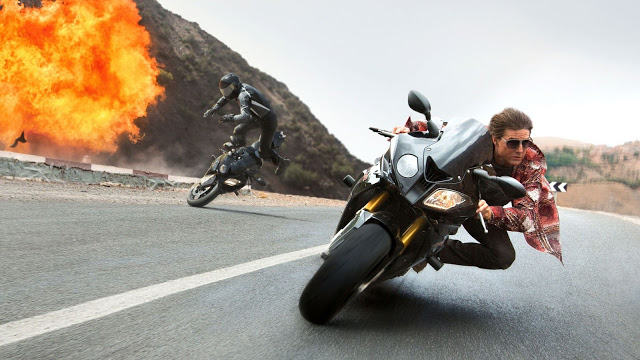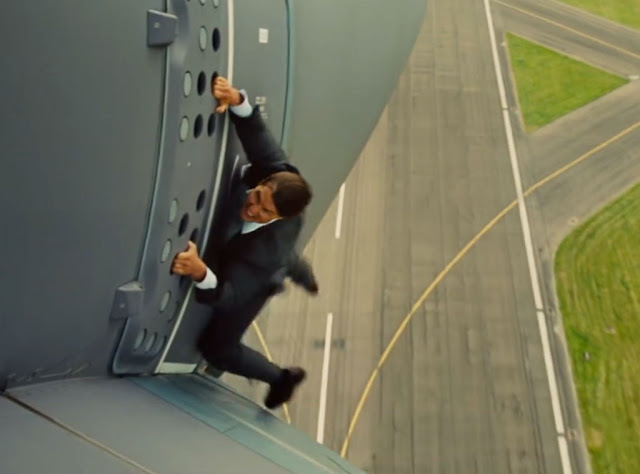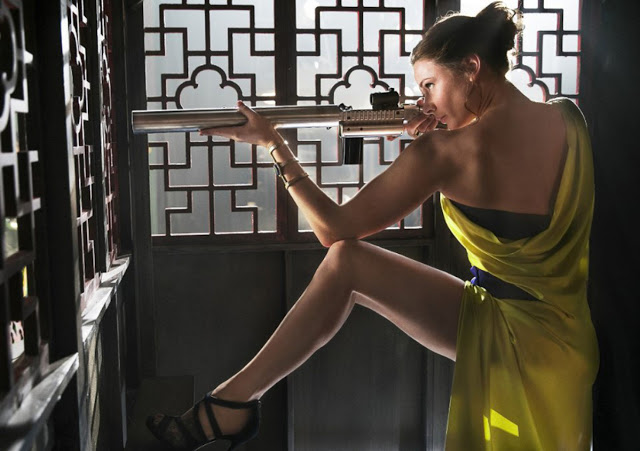Just what is the Rogue Nation, anyway? Is it the Syndicate, a group of presumed-dead spies working covertly to kill or corrupt fellow agents across the globe? Is it the IMF (that’s “Impossible Mission Force”, not “International Monetary Fund”), a disgraced organization that operates without oversight and that has come under legislative fire for its “wanton brinksmanship”? Or could it be the Mission: Impossible franchise itself, a series of supremely entertaining smashes that exhibit no interest in playing by industry rules? In an era of world-building and synthesis—of movies meshing with TV and of Batman battling Superman—these films are largely self-contained, eschewing continuity in favor of methodical reinvention and authorial vision. (Each installment has been helmed by a new director.) Models of energy, style, and craft, the Mission: Impossible movies don’t care about building a world; they just want to astonish an audience.
And does Rogue Nation ever do that. The fifth and flashiest entry in the Mission: Impossible series, Rogue Nation is a fleet and exhilarating affair, dazzling viewers with gripping stunt work and expertly conceived set pieces. To complain that it elevates action over story is to miss the point. Here, the action is the story. Each crackerjack chase sequence, each audacious stunt, each close-quarters combat scene—all are executed with the rigor and thoughtfulness typically reserved for screenwriting. When two men in this movie trade blows while cartwheeling along a rafter beam hundreds of feet in the air, you aren’t just taking in an obligatory fight scene. You’re watching art.
Of course, there can be no art without muses, and there would be no Mission: Impossible without Tom Cruise. Still wielding a high-wattage smile and a disarming directness, and as fit as when he dangled precariously from the CIA’s ceiling for Brian De Palma nineteen years ago, Cruise’s no-frills technique and glinting charm is what makes this franchise run (and run, and run). Well, that, and his insistence on performing most of own stunts, a level of dedication that borders on fanaticism. If you have browsed the Internet at any point in the past several months, you have likely learned that, to shoot Rogue Nation‘s opening sequence, Cruise voluntarily clung to an airplane during its flight, and that he did so for eight different takes. Perhaps the most impressive thing about Rogue Nation is that this death-defying achievement is far from the most impressive moment in the movie.
But it certainly starts things off with a bang, not to mention a big meta wink. Cruise is once again Ethan Hunt, the ageless secret agent who’s a cross between James Bond, Jack Bauer, and the Energizer Bunny. Ethan has saved the world countless times (most recently for Brad Bird in the terrific Ghost Protocol), but after defying death on that airplane, his relentless efforts to track down the mythical Syndicate have rendered him persona non grata. The IMF itself is in hot water, as Ethan’s handler, Brandt (Jeremy Renner, settling in nicely), is busy dodging damning questions from Hunley (an amusingly officious Alec Baldwin), a CIA bureaucrat intent on both apprehending Ethan and dismantling the IMF. But political warfare is irrelevant to Ethan, an inveterate spy who effortlessly evades capture while attempting to unravel the mystery of the Syndicate on his own. In case you couldn’t tell from his ragged beard, he’s gone rogue.
He also gets himself kidnapped, and lucky for us, since it puts him on a literal collision course with Ilsa Faust, a slinky number played with verve and poise by Rebecca Ferguson (buy stock while you can). Exactly who Rebecca works for isn’t initially clear, and the picture only grows cloudier as Rogue Nation progresses. Is she a loyal undercover officer of MI6, a sinister traitor serving the Syndicate, or both? I’m not entirely sure, but it doesn’t much matter, as the convoluted plot is really just a reason for Cruise and Ferguson to light up the screen together. As the Mission: Impossible sequels have progressed, they have grown increasingly disinterested in romance (only J.J. Abrams’s third entry, with Michelle Monaghan as Ethan’s fiancé, showed the hero grappling with the consequences of real love). That’s a sensible sacrifice—it’s difficult (though not impossible: see Casino Royale) for standalone action films to invest heavily in relationships when there is so much mayhem to unleash—but even though Ethan and Ilsa never lock lips, Cruise and Ferguson nevertheless develop some real chemistry. Their bond is different from your typical flirty banter—it’s more about a shared sense of excitement, a palpable enthusiasm for solving puzzles and kicking ass. (They even get their Luke and Leia moment at one point.) Up till now, the franchise has regularly discarded each of its heroines (I’m ignoring Monaghan’s Ghost Protocol cameo), but Paramount is advised to bring Ilsa back for volume six.
That’s true for the rest of the cast as well. Cruise may be the franchise’s MVP, but he’s less Kobe than LeBron; he works well with his teammates, and Rogue Nation receives strong contributions from its entire assemble. That begins with Benji (Simon Pegg, doing some real acting along with the usual comic relief), whom Ethan surreptitiously summons to Vienna for some surveillance help. This leads to the movie’s best and breeziest sequence, featuring a balance-beam battle—part fight, part gymnastics, part ballet—followed by a trio of snipers all taking aim at the same unwitting target. It’s also the moment where director Christopher McQuarrie truly makes the movie his own. McQuarrie previously worked with Cruise on the robust but glum Jack Reacher, but here he shows a strong command of action and, more importantly, quickness. His camera is fast but not frenetic, and the practical stunts help convey a sense of real speed, whether it’s the wind blasting in Cruise’s face on that airplane or a bevy of motorbikes careening through traffic on a winding Moroccan highway.
That would be in Casablanca, which means Rogue Nation is the second (and by far the loudest) movie to place a woman named Ilsa in that immortal city. It’s during this extended North-African interlude where McQuarrie (who also wrote the screenplay, sharing a story credit with Drew Pearce) and his team settle into a relaxed and pleasurable pattern, alternating between stupendous action scenes and giddily implausible spy craft. The Casablanca passage also features the return of Luther (Ving Rhames, fine wine), Ethan’s longtime comrade in espionage, here partnering with Brandt to supply crotchety backup and delightful Laurel-and-Hardy patter. Luther is there to help the crew obtain a MacGuffin in the form of a hard drive, which is of course just an excuse for those aforementioned action scenes. Nothing in Rogue Nation quite rivals Ghost Protocol‘s historic Burj Khalifa sequence, but that’s hardly a fair standard. We’re still treated to a beautifully filmed underwater sequence, where Ethan juggles multiple pieces of equipment while eluding gigantic rotors, all while racing the clock and holding his breath. And then there’s that motorcycle chase, the riders dipping their bikes sideways with every curve of the road; it’s an absolute rush that makes an analogous scene from John Woo’s Mission: Impossible 2 feel like a film-school project by comparison.
This is all tremendous fun, even if it’s a bit hollow. Yes, there’s a villain, a pretty good one in the form of Solomon Lane (’71‘s Sean Harris, slippery and scary), the Syndicate’s remorseless leader who speaks about his anarchic aims in a chilling whisper. (His line, “If I were a terrorist, I would be trying to spread fear,” is one of cinema’s more thoughtful defenses to insane megalomania.) But despite a few calculated deaths and some ominous words, the stakes here never feel all that high, maybe because we know that, as Hunley puts it, Ethan is always prepared for every conceivable scenario. (To wit: Those infamous masks return, though not before McQuarrie pulls a clever fake-out.) When the heroes are so heroically capable, there can only be so much suspense.
But this feels less like a failure than a choice, and the right one. Injecting Rogue Nation with gravity would weigh it down, which would run contrary to the buoyant, puckish spirit of the franchise. The Mission: Impossible movies aren’t about life or death. They’re about frills and thrills, and mesmerizing viewers with their uncanny combination of ludicrous action and practical, spit-and-glue filmmaking. That’s why the only truly alarming moment in Mission: Impossible—Rogue Nation comes midway through, when Brandt gloomily tells Ethan, “This may be our last mission.” God, I hope not.
Jeremy Beck is the editor-in-chief of MovieManifesto. He watches more movies and television than he probably should.



